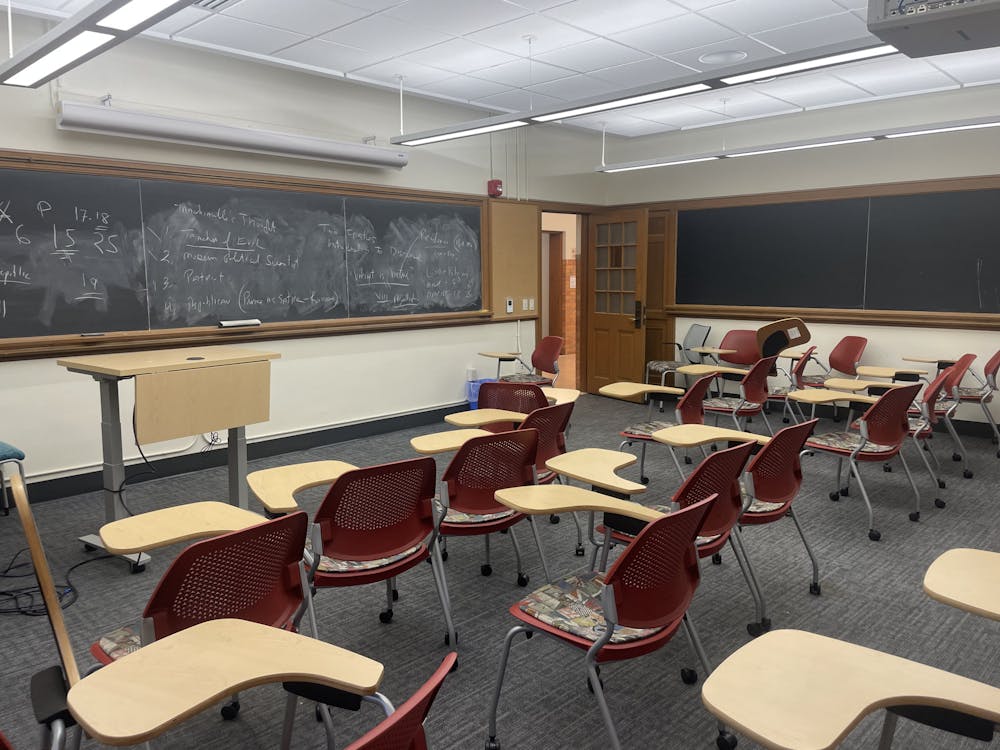As the 2024 U.S. presidential election quickly approaches, classes at Middlebury covering American politics and economics are focusing on contemporary election-related material, whether by design or due to the election’s increasing prevalence across disciplines. In this year’s particularly contentious, polarizing election, whose result is widely understood to be pivotal to American democracy, teaching and being a student in election-relevant classes is a compelling position to occupy.
It is no secret that Middlebury students hold mostly liberal political views. In The Campus’ Zeitgeist 6.0 survey, 79% of student respondents who rated their political views on a scale of 0–10 — with 0 being the most liberal and 10 being the most conservative — placed themselves in the 0-3 range. The most common response, chosen by 30% of respondents, was a two. Only 10% of survey respondents described themselves as leaning conservative, having chosen a rating greater than five.
Some professors acknowledge that the majority of their students support Vice President Kamala Harris for president over former President Donald Trump, but avoid sharing their own views in classrooms, instead focusing their classes on the analytical and scholarly aspects of the election. Professor of Political Science Matthew Dickinson — who has published several books and articles on the presidency, presidential elections and other national governing institutions — said that students self-select into his classes because they know he will never share his political views, even if his colleagues do.
Dickinson is currently teaching the courses “American Presidency,” “U.S. National Elections” and a first year seminar, “American President Biography.” In his U.S. National Elections course, students are tasked with forming their own predictions for the outcome of the election, an assignment which is due on Election Day.
“I think most of [my students] have preferences, but my courses are courses in which students really feel comfortable no matter what their views are discussing things, and there’s no ideological litmus test or anything,” Dickinson said. “We’re interested in the why, why is Harris ahead in the polls, why wasn’t Biden doing well, we don’t discuss a lot of, why should you vote for Harris, why should you vote for Trump.”
Bert Johnson, professor of Political Science who also specializes in American politics, is teaching “Introduction to American Politics” and the seminar “Future of U.S. Democracy,” a course he designed with November’s presidential election in mind. Discussions in both classes touch on the election frequently, covering topics such as disinformation, money in politics, presidential power, populism as an issue and democratic backsliding. Like Dickinson, Johnson does not share his personal views in discussions.
“I decided, ‘Hey, I want to teach a class that is relevant to the election,’ and as part of that class read as much as the brand new contemporary research on U.S. politics as I can, and bring students along with me in that conversation,” Johnson said.
Johnson also said that he thinks talking about any election in classes is important, but that the high-stakes nature of this election has been particularly motivational for students.
“I think in some ways the students that I have in my classes are really inspiring in that there’s an optimism there that I don’t always see in my audiences,” Johnson said.
In Associate Professor of Economics Obie Porteous’s “International Economics: Theory and Policy” class, a course required for all International Politics & Economics majors, students have read and discussed recent news articles pertaining to the trade tariff policies of the presidential candidates, including “A Second Trump Presidency Stands to Radically Remake World Trade” and “Off the charts: How Trump tariffs would shock U.S, world economies.”
“Students are always eager to see the real-world connection to what they’re learning in the classroom and how this relates to what’s going on in the real world, and so for me the election is providing that real-world connection,” Porteous said.
Porteous has found it helpful to explicitly recognize in class that students probably have different opinions and strong feelings about the election and encourage them to consider this reality before they speak.
“I try to approach classroom discussion of election-related topics as objectively as possible, so that students don’t feel like I’m trying to kind of push an agenda on them,” Porteous said. “That doesn’t mean that if we do the objective analysis of the policy and find that one candidate's proposed policy is objectively better than the other, well, I don’t want to shy away from that finding.”
Caitlin Budzik ’25.5, a political science major enrolled both in Dickinson’s U.S. Elections class and in Johnson’s Future of U.S. Democracy seminar, said that student perspectives shared in class discussions are almost exclusively liberal and that if students hold conservative views, they refrain from sharing them. Instead, when there is tension in classes, it is usually between those who are pessimistic and those who are optimistic about the election and the future of U.S. politics.
“There’s definitely emotion. It’s a lot of nervousness just because of the political leanings of Middlebury’s campus, but I think that that’s always been the case in my poli-sci classes,” Budzik said.
Ryan Muller ’25, also a political science major enrolled in U.S Elections, Future of U.S Democracy and Professor of Political Science Murray Dry’s “American Constitutional Law” class, echoed Budzik’s statements about the general consensus among students that Harris is the preferred candidate and palpable anxieties in class over a potential Trump victory.
“I think for the most part people are able to have generally pretty open and honest conversations about is, and I think that’s something I can often find lacking on Middlebury’s campus — the ability to speak freely about things, so I think professors especially have done good job about letting those conversations happen when they pop up,” Muller said.
Muller corroborated that Dickinson takes a particularly impartial pedagogical approach, never having stated an opinion about a candidate in any of the several classes he has taken with him, while Dry has been more open about his opposition to Trump.
The content of American politics-based courses will shift during election week and once a candidate has won.
“I usually devote the first class after the election to talk a little bit about those concerns, to talk about maybe some of the fears [students] might have and some of the hopes they might have as well,” Dickinson said. “We will get to that — my course is not entirely devoid of a discussion of what they kind of hoped would happen.”
However, Dickinson also noted that he is inclined to put the election in historical context during these post-election classes, bring the discussion back to political science and reiterate the limited power of the president.
“The next couple days after the election will be a little bit post-mortem,” Muller said. “Taking a step back, taking a breath, surveying the scene and basically from there, being like, what’s next from either candidate?” Muller said.

Madeleine Kaptein '25.5 (she/her) is a managing editor.
Madeleine previously served as a staff writer, copy editor and local editor. She is a Comparative Literature major with minors in German and Art History. In Spring 2024, she studied abroad in Mainz, Germany, from where she wrote for the Addison Independent about her host country. In her free time, she enjoys journaling, long walks and runs, and uncomplicated visual arts projects.




